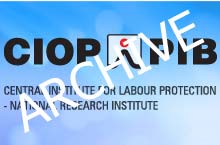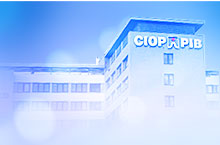- Chosen aspects of liability for discrimination and unequal treatment in employment
Wojciech Dyląg, p. 8-11
- Night shiftwork as a risk factor for cancerogenesis
Agata Kawalec, Krystyna Pawlas, p. 13-17
- Method of optimizing decision making in risk-burdened actions
Marcin Biernacki, p. 18-21
- Job burn-out – causes, symptoms, effects, prevention
Martyna Ostrowska, Aneta Michcik, p. 22-25
- Selecting protective clothing adjusted to staying and working in a cold environment
Andrzej Sobolewski, p. 26-30
Chosen aspects of liability for discrimination and unequal treatment in employment
Wojciech Dyląg
Requirement of equal treatment in employment and the prohibition of discrimination against workers is due to both the provisions of the Constitution, the Labour Code, the Civil Code, the Penal Code and the provisions of European and international law. Discrimination occurs when an employer treats a comparable situation of workers in different ways. The most common discrimination is the one based on age, gender and disability. A person whose employer has infringed the principle of equal treatment in employment has the right to claim damages in an amount not less than the minimum wage. The compensation, however, must be ruled by a court.
Night shiftwork as a risk factor for cancerogenesis
Agata Kawalec, Krystyna Pawlas
Nowadays organisation of work time often involves shiftwork, which affects workers'''' health.
This article analyses recent reports on the influence of shiftwork on the risk of carcinogenesis. It presents various definitions of shiftwork and the scale of the problem. It also discusses the latest research on the association between risk of breast, endometrial, prostate and colon cancer, and shiftwork. According to the position of the International Agency for Research on Cancer IARC, shiftwork that involves night work resulting in disturbance in the circadian rhythm is a potential carcinogenic factor, class 2A. Despite the sufficient evidence coming from experimental research performer on animals for the cancerogenicity of light during work at night, there is still limited evidence for the carcinogenicity of shiftwork at night performer by humans. We conclude that further research should focus on preventive strategies.
 |
Method of optimizing decision making in risk-burdened actions
Marcin Biernacki
Human error is a consequence of incorrect risk assessment in driving a car. In the performance of drivers of emergency vehicles, it is especially important that decisions are taken at an optimum risk level. This paper provides an introductory orientation to risk management in driving an emergency vehicle. The purpose of risk management is to emphasize the decision making process that people can use to minimize risk. Thus risk management provides techniques for maximizing safety margins and possible support for drivers in managing risk and errors.
Job burn-out – causes, symptoms, effects, prevention
Martyna Ostrowska, Aneta Michcik
In recent years, burn-out has become an increasingly common phenomenon. This article provides the reader with the origins, definitions and the most common causes and symptoms of burn-out. It presents phases of burn-out according to the American Psychology Association, and Freundenberger and North. This article draws attention to the consequences of this syndrome, both for the individual suffering from it and the organization. It also discusses ways of preventing this occupational disease and an analysis of selected studies.
Selecting protective clothing adjusted to staying and working in a cold environment
Andrzej Sobolewski
This article is aimed at people engaged in assessing thermal load acting on human working in cool and cold environments. It presents the principles of selecting clothing with insulation appropriate for staying in these environments. Those principles are based on theoretical assumptions resulting from the present level of knowledge.
|









